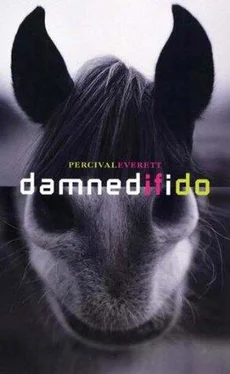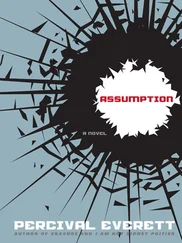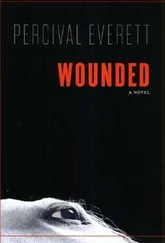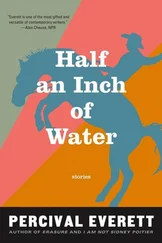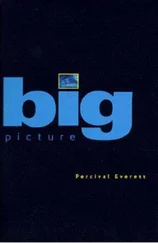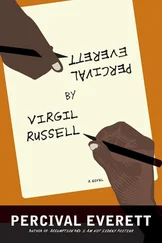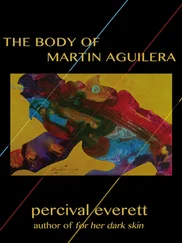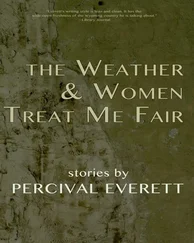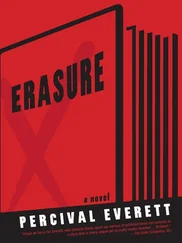While he folded the paper, Harvey said, “Now, if you could get me that gun.” He handed me the form, then looked over at the woodstove, sitting on uneven bricks on the warped linoleum. “Where is the gun, ma’am?”
“It’s in my bedroom. I sleep with it.”
“I’m going to have to take it,” he repeated. “While you’re getting it, I’ll bring in some wood for your stove.”
Mrs. Bickers stared at me for a couple of seconds and then left the room. I had a passing thought she might come back with the pistol and shoot me. She went to her bedroom, returned, and put the gun on the table in front of me. A.22 target pistol. I watched her pour water into two cups, then measure spoonfuls of powdered coffee.
Harvey came in with the wood. “I swear it feels like it’s going to let loose with a real storm.” He stomped his boots clean on the rug inside the door. He put the logs down and came back to the table, looked at the pistol. “Mercy, Mrs. Bickers, how do you even lift that thing, much less fire it?”
“I do just fine. Here’s the coffee.” She put the mugs on the table. “You drink, I’ll start the fire.” She knelt by the stove and began to twist up sheets of newspaper from a plastic crate.
The deputy and I sat and took a couple of sips of the coffee. Finally, Harvey picked up the pistol and popped out the clip, put it in his shirt pocket. “You got any other guns, ma’am?”
“No.”
“Just asking.”
“I’ve got to get to work,” I said.
“Okay, Mrs. Bickers, we’ll be leaving now. Thanks for your cooperation and the coffee and your time.”
The woman nodded and followed close behind us toward the front door. We were on the porch, the door was shut. Mrs. Bickers was on the other side.

The problem with the old Jeep was that you had to be sure to park it on a hill if you wanted to start it again. The alternator turned to no decent result and even if it did, the old battery couldn’t hold a charge. The flywheel of the starter was so sticky that if you tried to crank it over, a good battery would have drained anyway. Sometimes, finding a hill was a hell of a job. I was okay at my place on the mountain, but when I drove down to Taos, I was in trouble. There was a little slope about a mile from the plaza, outside a business called The Chicken Lady. The Chicken Lady, who sold chickens, geese, and ducks, allowed me to park on the hill, all 250 pounds of him. In exchange, I allowed him to put a FOR SALE sign on the windshield of my truck. He loved to dicker about price and tell great lies about its history to Texans and Oklahomans who romanticized such relics.
“Rawley,” he said, greeting me as I backed up the hill.
“Chick.”
He watched as I set the brake, climbed out, and put my rock in front of the rear tire. “Why don’t you get your rig fixed up?” the Chicken Lady asked me. He was holding a big black rooster under one arm and an unlit cigar in his free hand. He looked at the end of the cigar as if surprised it was cold.
“Oh, I don’t know,” I said. “I don’t mind the walk when I come down here. And on the mountain, it’s never a problem.”
“Seems like a hassle to me,” he said.
“What’s wrong with a hassle? Besides, I know it’s coming.”
“Still, the thing looks like hell.”
I looked at my truck. “True enough.”
The rooster pecked at a button on the Chicken Lady’s shirt.
“I’ll be back in an hour or so,” I said. I watched as he slipped the sign under a wiper. “What if somebody meets your price?”
“It ain’t happening,” the big man said.
I never much warmed to Taos with all its galleries, which might have been one for all the sameness, with its trendy air and restaurants charging a fortune for what you could buy at the bowling alley for nickels. But the town was there and it had a grocery market better than the convenience store in Questa. It also offered a fly-fishing shop and I guess I owed a thank you to yuppies and the Orvis catalog for that. Before lunch and shopping on my bimonthly visits, I’d stop in and shake the expensive graphite rods and run my fingers along the even more expensive bamboo sticks. There were always a couple of guys in there engaged in fish talk with the owner.
“I hear they’re hitting on stonefly nymphs up in the Box.”
“So, what do you think of these new four-hundred-dollar waders?”
To that question, that day, I had to chime in and say, “It’d be a shame to get them wet.”
The owner, a squirrely looking fellow despite his pudginess, a bearded transplant from Vermont, shot me a face. He hadn’t liked me since I told him I couldn’t find a place to fish the Battenkill where I couldn’t see a house or a road. And he couldn’t believe I actually fished with a turn-of-the-century Abercrombie and Fitch bamboo rod.
I had said to him, “What do you expect me to do? Stick it in some silly display case?” Then I happened to glance up at the wall behind him and saw a 1930 Wright and McGill rod behind glass. Basically, since then he thought I was nuts.
One of the fisher guys said, “Somebody told me there’re cutthroat in the Rio Grande.”
“That’s a myth,” Vermont said.
“I ate a myth the other night.” I put back the $150 metal fly box. “Fish the confluence of the Grande and the Hondo.” Then I thought to have a little fun. “Wait until right after the rafters go by and throw a weighted zug bug behind one of the big rocks.”
“That’s where you catch cuttthroats?” the man who had brought up the subject asked.
“Browns and rainbows, too. If it’s cold enough, you might get lucky and see a flash of red. But, hey, they all taste the same.” I tossed the last bit in to get under their skins. I catch and release as much as the next guy, but I despise religions of all kinds.
I left the shop seeming a little like a bully, which was a bad feeling, but like most feelings, I knew it would pass. I was having one of my what-the-hell-am-I-doing-in-this-stinking-town epiphanies when a big man threatened to slap handcuffs on me.
“Kiss me first,” I said.
Deputy Jack filled most doorways and I felt happy to call him a friend. He fished and camped with me and was always asking to go elk hunting, but I told him gunfire hurt my ears. He said, “Didn’t I just see you down here three weeks ago?”
“Out of toilet paper and I figured they must have a lot of it down here. With so many assholes and all.”
“A buddy and I are driving over to the Chama on Saturday. Wanna go?”
“I’ve got to work.”
“You don’t work,” he said.
“It doesn’t look like I work.”
“You know you ought to just tell people you write that shit. Right now they think you’re a pot farmer, or worse, that you’re just rich.”
“I’m not telling anybody I write romance novels.” I glanced up and down the street. “And you promised not to tell anybody either, remember.”
“Your secret is safe with me, Lance.”
“Call me Friday about fishing,” I said. “Maybe I will go.”
“You bet.”
I shopped, then lugged some of my goods back through town. I nodded to a couple of people and responded to offers of rides by shaking my head. The heavy stuff, bags of animal feed and the like, I left to pick up with the truck, motor running all the while. When I got back to the Chicken Lady’s, he seemed troubled. I asked what was wrong.
“Remember when you asked me what if somebody met my price?” He was still holding the rooster.
“You didn’t sell my truck?”
“No, I didn’t do that. But this fella wants it real bad. Says he’s making a movie or some shit and, anyway—” Chicken reached into his shirt pocket, pulled out a business card, and gave it to me. “That’s the guy’s name.”
Читать дальше
